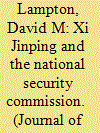| Srl | Item |
| 1 |
ID:
167071


|
|
|
|
|
| Summary/Abstract |
Policy entrepreneurs play a pivotal role in policy changes in both electoral democracies and authoritarian systems. By investigating the case of healthcare reform in Sanming City, this article illustrates how the fragmented bureaucracy in China enables and constrains local policy entrepreneurs, and how entrepreneurial manoeuvring succeeds in realigning the old institutional structures while attacking the vested interests. Both structural conditions and individual attributes are of critical importance to the success of policy entrepreneurship. Four factors and their dynamic interactions are central to local policy entrepreneurship: behavioural traits, political capital, network position and institutional framework. This study furthers theoretical discussion on policy entrepreneurship by elucidating the fluidity of interactional patterns between agent and structure in authoritarian China. The malleability of rigid institutions can be considerably increased by the active manoeuvring of entrepreneurial agents.
|
|
|
|
|
|
|
|
|
|
|
|
|
|
|
|
| 2 |
ID:
140475


|
|
|
|
|
| Summary/Abstract |
This article discusses the rationale for, and progress to date of, creating a National Security Commission in China, a move first announced in late 2013. Central impulses for the Commission's establishment are to help better coordinate a very fragmented bureaucracy and to advance Xi Jinping's drive to consolidate his personal power over the internal and external coercive and diplomatic arms of the governing structure. The Commission is a work in progress and its full institutional maturation will take a protracted period. In the midst of the Commission's construction, there is considerable confusion among subordinates in the foreign policy and security areas about lines of authority and ultimate objectives. Beyond Xi Jinping, it is difficult to discern an authoritative voice. It is an open question as to whether this institutional attempt to achieve coordination will improve, or further complicate, China's long-standing coordination problem, some recent foreign policy achievements notwithstanding. The Commission's focus is heavily weighted toward internal and periphery security, but it also is an institution-building response to new global and transnational issues. It is not self-evident that Xi, or any single individual, can effectively manage the span of control he is constructing.
|
|
|
|
|
|
|
|
|
|
|
|
|
|
|
|